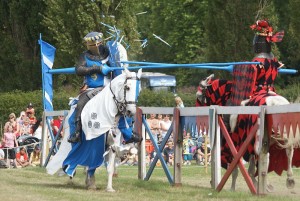
On this day in history, 7th February 1526, the traditional Shrovetide joust took place at Greenwich Palace.
The joust’s theme was unrequited love. Henry Courtenay, Marquess of Exeter, and his team of men wore green velvet and crimson satin embroidered with burning hearts. Above these hearts, a lady’s hand was depicted coming out of a cloud and holding a watering can which dropped silver droplets on the burning hearts to quench them. Henry VIII’s team wore cloth of gold and silver richly embroidered with a man’s heart in a press, surrounded by flames and bearing the motto Declare ie nose, Declare I dare not. The theme of unrequited love, with the burning hearts being quenched by a woman, along with the motto, signified that the King was wooing a new love. It is thought that this new love was Anne Boleyn, who, of course, did reject the King’s advances at first.
Can you imagine these men in their glorious apparel? What a spectacle it must have been and how wonderful to have been the woman at the heart of this chivalric display!
Chronicler Edward Hall records how “many a spere” was broken at the joust and ones of these breaks ended up being rather nasty for Sir Francis Bryan. According to Hall, the “shiueryng [shivering]”, i.e. splintering, of a spear caused Bryan to lose an eye. Bryan was lucky, though, as Henry II of France had the same happen to him in June 1559 and the splinters pierced his eye and entered his brain, causing him to die a few days later. In 2007, re-enactor Paul Allen was killed while re-enacting a joust when a splinter sheared off a lance, entered the eye slit of his visor and penetrated his eye and brain. A tragic accident. Bryan suffered no long-term ill effects and lived until 2nd February 1550.
You can read more about Henry VIII’s relationship with Anne Boleyn in the following articles:
- Henry VIII Falls in Love with Anne Boleyn
- A Timeline of Anne Boleyn’s Relationship with Henry VIII from 1528-1533
Also on this day in history…
- 1478 – Traditional birthdate of Sir Thomas More, Henry VIII’s Lord Chancellor, in Milk Street, London. Click here to read more about More.
- 1531 – Convocation ordered to recognise Henry as “sole protector and supreme head of the English church and clergy”. The resulting “haggling” results in Thomas Cromwell adding the phrase “so far as the law of Christ allows”.
- 1587 – Sir Amyas Paulet read out Mary, Queen of Scots’ death warrant to her, and informed her that she would be executed the following day.
Notes and Sources
- Hall’s Chronicle, Edward Hall, p707-708.
- Jouster killed in freak accident when shattered lance spears him through the eye during Time team re-enactment, http://www.dailymail.co.uk/news/article-1351018/Jouster-Paul-Allen-killed-lance-splinter-Time-Team-enactment.html
Image: Jousting at Hever Castle, Kent, © Copyright Peter Trimming and licensed for reuse under this Creative Commons Licence.